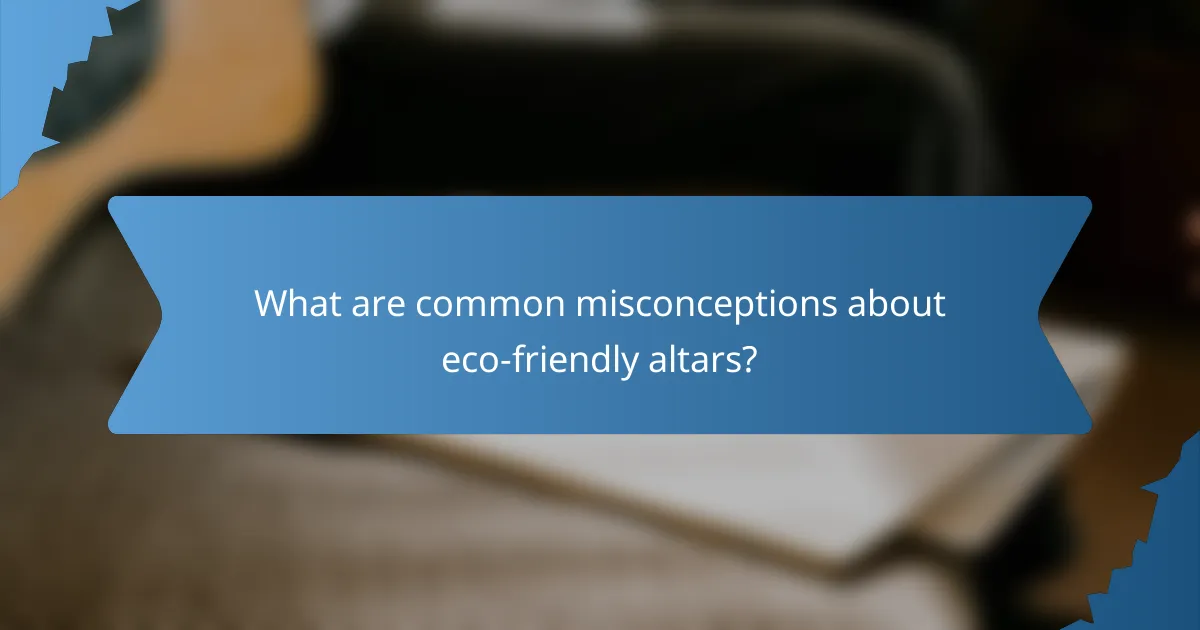Creating an eco-friendly altar is a meaningful way to enhance your spiritual practice while honoring the environment. By utilizing sustainable materials like bamboo, organic cotton, and recycled glass, you can achieve a natural aesthetic that reflects your commitment to ethical sourcing and minimal environmental impact. Consider supporting local artisans and eco-conscious retailers to find handcrafted items that resonate with your values.

How to create an eco-friendly altar?
Creating an eco-friendly altar involves using sustainable materials, ensuring an organic aesthetic, and sourcing items ethically. Focus on natural elements that minimize environmental impact while enhancing the spiritual experience.
Use reclaimed wood
Reclaimed wood is an excellent choice for building an altar as it reduces the demand for new lumber and gives a rustic charm. Look for wood sourced from old buildings, furniture, or pallets, which can often be found at local salvage yards or online marketplaces.
When selecting reclaimed wood, check for any treatments or finishes that may contain harmful chemicals. Opt for untreated or naturally finished wood to maintain an eco-friendly approach.
Incorporate natural fabrics
Natural fabrics such as cotton, linen, or hemp can be used for altar cloths or decorations. These materials are biodegradable and often produced with fewer chemicals compared to synthetic fabrics.
Consider sourcing fabrics that are certified organic or fair trade to ensure ethical production practices. This not only supports sustainable agriculture but also promotes fair labor conditions.
Utilize biodegradable decorations
Choose decorations made from biodegradable materials like dried flowers, leaves, or handmade paper. These options add a natural touch to your altar while ensuring that they won’t contribute to landfill waste.
Avoid plastic or synthetic decorations, as they can take hundreds of years to decompose. Instead, consider seasonal decorations that can be composted after use, such as pinecones or seasonal fruits.
Choose sustainable candles
Sustainable candles made from soy, beeswax, or palm oil are better alternatives to paraffin candles, which are derived from petroleum. Look for candles that are labeled as eco-friendly and free from synthetic fragrances.
Beeswax candles, for example, burn longer and produce less soot, making them a healthier choice for indoor use. Ensure that any palm oil used is certified sustainable to avoid contributing to deforestation.
Opt for potted plants
Potted plants can enhance the natural look of your altar while improving air quality. Choose low-maintenance plants like succulents or herbs, which require minimal resources and care.
Consider using locally sourced plants to reduce transportation emissions and support local growers. Additionally, these plants can be reused or replanted, making them a sustainable choice for your altar setup.

What sustainable materials are best for an altar?
When creating an eco-friendly altar, the best sustainable materials include bamboo, organic cotton, recycled glass, and natural stone. These materials not only provide a natural aesthetic but also ensure ethical sourcing and minimal environmental impact.
Bamboo for structural elements
Bamboo is an excellent choice for the structural components of an altar due to its strength and rapid growth. It can be used for frames, shelves, and supports, making it both functional and sustainable.
When selecting bamboo, look for products that are certified by organizations such as the Forest Stewardship Council (FSC) to ensure responsible harvesting practices. This guarantees that the bamboo is sourced from well-managed forests.
Organic cotton for altar cloths
Organic cotton is ideal for altar cloths as it is grown without synthetic pesticides or fertilizers, making it safer for the environment. This material provides a soft, natural look that enhances the altar’s aesthetic.
When choosing organic cotton, consider fabrics that are certified by the Global Organic Textile Standard (GOTS) to ensure they meet strict environmental and social criteria. This certification helps support sustainable farming practices and fair labor conditions.
Recycled glass for candle holders
Recycled glass is a sustainable option for candle holders, as it reduces waste and minimizes the need for new raw materials. Using glass that has been repurposed can add a unique touch to your altar while being environmentally friendly.
Look for candle holders made from at least 50% recycled glass to maximize sustainability. This not only supports recycling efforts but also often results in beautiful, one-of-a-kind designs.
Natural stone for bases
Natural stone, such as slate or granite, can serve as a durable base for an altar. These materials are long-lasting and provide a solid foundation, enhancing the overall stability of the altar.
When selecting natural stone, consider sourcing locally to reduce transportation emissions and support regional quarrying practices. Ensure that the stone is ethically mined, which can often be verified through supplier certifications.

Where to source ethical altar materials?
To source ethical altar materials, consider local artisans, eco-conscious online retailers, and farmers’ markets. These options provide sustainable, handcrafted, and organic products that align with eco-friendly values.
Local artisans for handcrafted items
Local artisans often create unique altar items using sustainable practices and materials. By purchasing directly from them, you support the local economy and reduce the carbon footprint associated with shipping. Look for artisans at craft fairs or community events.
When selecting handcrafted items, inquire about the materials used to ensure they are ethically sourced. Many artisans are happy to share their process and the origins of their materials, which can enhance the significance of your altar.
Eco-conscious online retailers
Eco-conscious online retailers specialize in sustainable products, offering a wide range of altar materials from around the globe. These platforms often provide detailed information about the sourcing and environmental impact of their products, helping you make informed choices.
When shopping online, look for certifications such as Fair Trade or organic labels to ensure the products meet ethical standards. Compare retailers to find the best prices and shipping options, keeping in mind that some may offer free shipping for larger orders.
Farmers’ markets for organic products
Farmers’ markets are excellent sources for organic altar materials, such as herbs, flowers, and natural decorations. These markets typically feature local growers who prioritize sustainable farming practices, ensuring that your altar reflects a commitment to the environment.
Visiting farmers’ markets allows you to connect with vendors and learn about their growing methods. This personal interaction can enhance your understanding of the materials you choose and their significance in your altar’s design.

What are the benefits of using natural materials?
Using natural materials for an eco-friendly altar offers numerous advantages, including reduced environmental impact, enhanced aesthetic appeal, and support for local economies. These benefits contribute to a more sustainable and ethical approach to creating meaningful spaces.
Reduces environmental impact
Natural materials typically have a lower carbon footprint compared to synthetic alternatives. Sourcing items like wood, stone, or clay from sustainable sources minimizes resource depletion and pollution. Opting for locally sourced materials further reduces transportation emissions.
When selecting natural materials, consider their biodegradability and the energy required for production. For example, bamboo grows rapidly and can be harvested sustainably, making it a great choice for eco-friendly projects.
Enhances aesthetic appeal
Natural materials provide a warm, organic look that enhances the visual appeal of an altar. Textures and colors found in wood, stone, and textiles create a serene atmosphere, inviting reflection and connection.
Incorporating elements like driftwood, unpolished stones, or handmade pottery can add unique character to your altar. These materials often carry stories and histories, enriching the overall experience.
Supports local economies
Choosing natural materials often means supporting local artisans and businesses, which strengthens community ties. This practice helps sustain traditional crafts and promotes ethical sourcing practices.
When purchasing materials, look for local markets or cooperatives that prioritize fair trade and environmentally friendly practices. This not only benefits the local economy but also ensures that your altar is created with care and integrity.

How to maintain an eco-friendly altar?
Maintaining an eco-friendly altar involves using sustainable materials, natural cleaning products, and regularly updating it with fresh, ethically sourced items. This approach not only honors your spiritual practice but also respects the environment.
Regular cleaning with natural products
To keep your eco-friendly altar clean, use natural cleaning products such as vinegar, baking soda, or essential oils. These substances effectively remove dirt and grime without introducing harmful chemicals into your space.
Avoid commercial cleaners that contain synthetic fragrances or toxic ingredients. Instead, consider making your own cleaning solution by mixing equal parts of water and vinegar, which is both effective and environmentally friendly.
Seasonal updates with fresh materials
Updating your altar seasonally with fresh materials enhances its natural look and keeps your practice vibrant. Consider incorporating seasonal flowers, herbs, or stones that resonate with the current time of year.
For example, in spring, you might add fresh blooms or greenery, while autumn could inspire the use of colorful leaves or pumpkins. Ensure that these materials are ethically sourced, either from your garden or local markets, to maintain your altar’s eco-friendly ethos.

What are common misconceptions about eco-friendly altars?
Many people mistakenly believe that eco-friendly altars lack durability and aesthetic appeal. In reality, sustainable materials can offer both longevity and a natural beauty that enhances spiritual practices.
Natural materials are not durable
A common myth is that natural materials used in eco-friendly altars are inherently less durable than synthetic options. In fact, many sustainable materials, such as bamboo, reclaimed wood, and stone, can be incredibly resilient when properly cared for.
For instance, bamboo is known for its strength and flexibility, making it suitable for various altar designs. Similarly, reclaimed wood not only provides a rustic charm but also has a history that adds depth to the altar’s significance.
To ensure longevity, consider applying natural sealants or finishes that protect the materials from wear and environmental factors. Regular maintenance, such as cleaning and occasional refinishing, can further extend the life of your eco-friendly altar.
